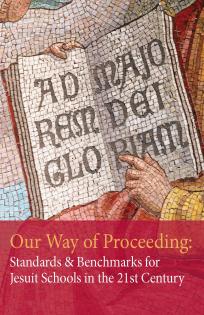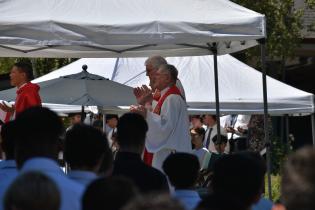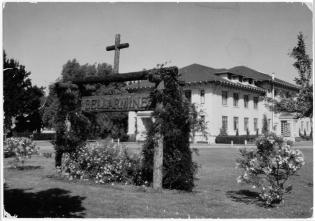From its simple roots of seven men, the Society of Jesus was founded in 1540 by St. Ignatius of Loyola. Today, the Society numbers almost 17,000 members who work in 80 provinces worldwide, five of which are in the United States.
Bellarmine College Preparatory is one of more than five dozen Jesuit high schools in the U.S., each built upon the principles of the Ratio Studiorum, the spiritually-based education system initially developed by Ignatius for new members of the Order.
Ignatius saw education as a way to lead young people not simply to care for others but to "find God in all things."
Bellarmine History
Bellarmine, the second oldest Jesuit high school west of the Mississippi River, was founded in 1851 by John Nobili, S.J., and his companions, as Santa Clara College, a school for secondary and college-age students. Santa Clara College was separated into 2 schools in the early 1920s—Santa Clara University and the University of Santa Clara High School, or Santa Clara Prep. In 1925, Santa Clara Prep moved from the grounds of the University to our current location on University and Elm Streets in College Park. In 1928, the school became Bellarmine College Preparatory, in honor of Robert Cardinal Bellarmine, a Jesuit of the sixteenth century who had recently been canonized a saint and recognized as a Doctor of the Church.
Bellarmine finds inspiration in the Jesuit motto "ad majorem Dei gloriam"—for the greater glory of God—and is honored to carry on the tradition of education mindful of cultivating one's gifts and talents, not for our enjoyment, but rather for the service of advancing God's work in today's world.
Our Jesuit Community
Bellarmine is very fortunate to have a community of Jesuits who live on campus. These men are involved in the daily life of the school in mays ways - from the classroom to sports sidelines. Bellarmine offers Mass several times a year for the entire school community as well as weekly in Leontyne Chapel. Other Sacraments are offered over the course of the school year, including Reconciliation services via Religious Studies classes and Confirmation classes for seniors.
While the presence of Jesuits on campus is significant and meaningful, many Bellarmine faculty and staff members are also deeply rooted in Ignatian Spirituality, as evidenced by their own study and personal experience. For the past several years, all Bellarmine employees have been growing in a deeper understanding of Ignatian Spirituality, and strive to translate the vision of Ignatius of Loyola into a real and meaningful experience for students inside and outside of the classroom.
Jesuit Pedagogy

The particular way in which all Jesuit schools, including Bellarmine, fulfill this mission is articulated in Our Way of Proceeding, which indicates the standards and benchmarks for Jesuit education in the 21st century as categorized in five domains—Jesuit and Catholic Mission and Identity, Governance and Leadership, Spiritual Formation, Educational Excellence, and Faith That Does Justice.

